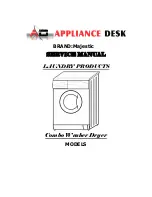
15 of 18
®
STANLEY Electric Pressure Washers
Rev: Dec2010
MAINTENANCE
GENERAL MAINTENANCE RECOMMENDATIONS
The pressure washer warranty does not cover items that have been subjected to
operator abuse or negligence. To receive full value from the warranty, the
operator must maintain the pressure washer as instructed in this manual.
NOTE:
Should you have questions about replacing components on your pressure
washer, please call
[1] 919-550-3259
for assistance.
All maintenance in this manual should be made at least once each season.
Before Each Use
1. Check water inlet screen for damage.
2. Check high pressure hose for leaks.
3. Check detergent siphoning tube and filter for damage.
4. Check spray gun, nozzle extension, and nozzles for leaks.
5. Rinse out garden hose to flush out debris.
The high pressure stream of water that this equipment produces can
pierce skin and its underlying tissues, leading to serious injury and
possible amputation.
Replacement hose rating MUST exceed maximum pressure rating of unit.
WARNING
Check Detergent Siphoning Tube
Examine the filter on the detergent tube and clean if clogged. The tube should fit
tightly on the barbed fitting. Examine the tube for leaks or tears. Replace the
filter or tube if either is damaged.
Check Gun and Nozzle Extension
Examine the hose connection to the spray gun and make sure it is secure. Test
the trigger by pressing it and making sure it springs back into place when you
release it. Put the trigger lock in the on position and test the trigger. You should
not be able to press the trigger.
Check High Pressure Hose
The high pressure hose can develop leaks from wear, kinking, or abuse. Inspect
the hose each time before using it. Check for cuts, leaks, abrasions or bulging of
cover, damage or movement of couplings. If any of these conditions exist,
replace the hose immediately.
Adjustable Nozzle Maintenance
Surging, or pulsing sensation, felt while squeezing the spray gun trigger may
be caused by excessive pump pressure. The principal cause of excessive pump
pressure is a nozzle clogged or restricted with foreign materials, such as dirt,
etc. To correct the problem, immediately clean the nozzle using the tools
included with your pressure washer and follow these instructions:
1.
Shut off pressure washer and turn off water supply.
2.
Depressurize unit by squeezing trigger with wand away from face.
3.
Remove wand from gun
4.
Use needle included in kit to free any foreign material clogging or
restricting spray tip, see Figure below.
Connections
Connections on pressure washer hoses, gun and spray wand should be cleaned
regularly and lubricated with non-water soluble grease.
Adjustable Nozzle
For the adjustable nozzle, you can also lubricate the nozzle collar (high-pressure
low-pressure) by using non-water soluble grease regularly.
Water Filter Screen
The pressure washer is equipped with a water inlet filter that prevents debris
going into the pump. If the filter is not kept clean, the flow of water to the
pressure washer will be restricted and the pump may be damaged.
1.
To clean the screen, remove quick connector and remove the filter screen
from the pump inlet.
2.
Rinse filter screen with warm water until it is free of debris and blockage.
Check for any damage, replace if damaged.
3. Reinstall screen and quick-connector immediately.
Air Vents
The air vents located around the recoil of the pressure washer must be kept
clean and free of any obstructions to ensure proper air-cooling of the motor
during operation.
O–Ring Maintenance
Through the normal operation of your pressure washer, o–rings, which keep the
connections of the hoses and spray gun tight and leak–free, may become worn
or damaged. They should be lubricated with non-water soluble grease.
The high pressure stream of water that this equipment produces can
pierce skin and its underlying tissues, leading to serious injury and
possible amputation.
NEVER repair leaking connections with sealant of any kind. Replace o-ring
or seal.
WARNING





































